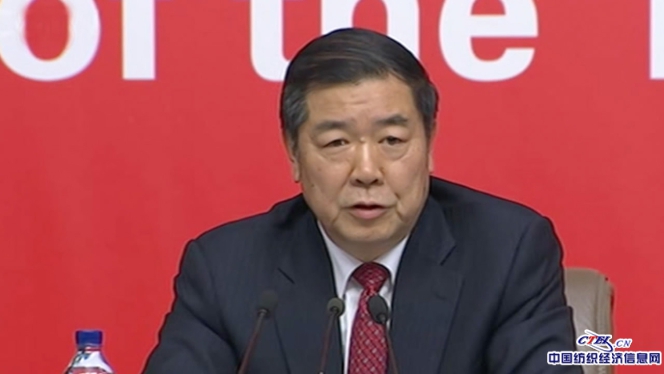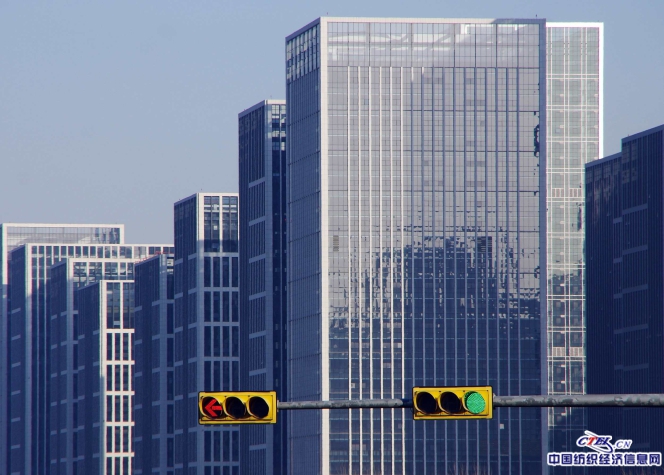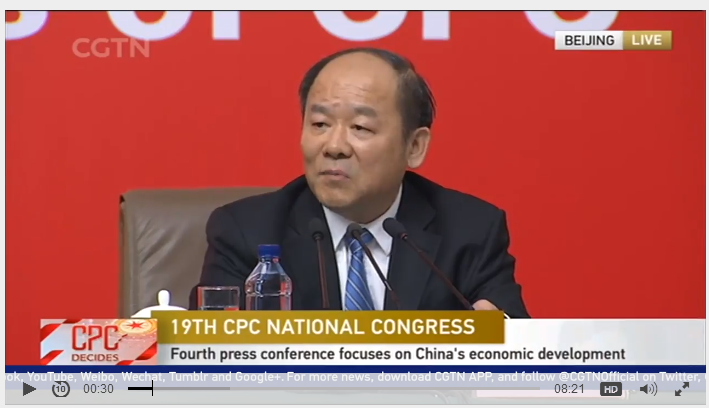


China’s gross domestic product (GDP) will exceed 80 trillion yuan (about 12.1 trillion US dollars) in 2017, and this year’s growth target of around 6.5 percent is expected to be fulfilled successfully, said He Lifeng, head of the National Development and Reform Commission, on Saturday.
He made the remarks at a press conference on the sidelines of the 19th National Congress of the Communist Party of China (CPC).
Since the 18th CPC National Congress in 2012, China's economy expanded by an average annual rate of 7.2 percent (2013-2016), outstripping the 2.6-percent average global growth and the 4-percent growth of developing economies.
The country’s GDP expanded 6.9 percent year on year to 59.3 trillion yuan in the first three quarters of 2017, holding steady from a 6.9-percent growth in the first half despite a slightly slower 6.8-percent increase in the third quarter.
China "has the confidence and capability" to realize the goal of developing into a great modern socialist country by the middle of this century, He said, adding that progress has been made in advancing institutional reform, cutting excessive industrial capacity and pushing for economic upgrading.
China has reduced production capacity of over 100 million metric tons of steel, and over 400 million metric tons of coal.

Measures to fight pollution don't have a big impact on economic growth, but a positive impact on economic development in the long run, said Zhang Yong, deputy head of the NDRC.
The value-added output of China’s high-tech industry and equipment manufacturing increased at an annual rate of 11.3 percent and 9.4 percent respectively on average over the past five years.
For the first three quarters of this year, the value-added output of the service industry accounted for 52.9 percent of GDP, playing an ever-growing role in supporting economic and social development.
Consumption remained a strong force driving growth. Total retail sales of consumer goods have maintained a growth rate of above 10 percent, and the contribution rate of consumption to economy has accumulated to 9.7 percentage points. Consumer consumption has shifted from medium-to-low end to medium-to-high end in terms of quality of products and services.
New forms of consumption represented by Internet consumption developed fast, with nationwide online retail sales reaching 4.9 trillion yuan for the first three quarters of this year.
Rise of Chinese unicorns

Significant progress in Chinese innovation can be seen in the multiplying number of unicorns in the country.
The country is home to more than 90 unicorns, accounting for a third of the world, He noted. Unicorns are privately owned companies valued at over one billion US dollars, established within the past decade.
The spin-off of large companies is an important source of unicorns. More than 30 of the unicorns have broken away from industrial giants such as Alibaba and Tencent.
E-commerce, Internet finance, intelligent hardware and sharing economy are the natural habitat of more than half of the unicorns. Beijing, Shanghai, Shenzhen and Hangzhou are the unicorns' main breeding grounds.
The development of e-commerce, the sharing economy and online payment has helped improve people's lives, He said.
Private investment should play “a bigger role” in the future

China's private investment, which plays a critical part in Chinese economy, has kept growing at steady and sustained pace this year, and it should play a bigger role in the future, said Zhang Yong, at Saturday’s press conference.
Private investment accounted for at least 60 percent of China's total fixed-asset investment. It generated 80 percent of China's jobs, 60 percent of the GDP and 50 percent of the tax revenue.
Private sector investment grew 6 percent in the first nine months, accounting for 60.5 percent of the total, according to NBS.
The pace of growth cooled from 6.4 percent for January-August after the country's total fixed-asset investment lost steam and the property and manufacturing sectors underwent a difficult time.
Despite the hardships, the growth rate in the first three quarters is 3.5 percentage points higher than the same period a year ago, Zhang noted, adding that private investment growth has anchored from last year's weakness.
Zhang also underlined the importance of implementing supportive policy for private investors such as streamlining administrative procedures and cutting red tape, lowering market threshold, applying negative-list approach and increasing market transparency.
Foreign investment policy more 'open, equitable, and convenient'

China's foreign investment policy will be more open, equitable and convenient, said Ning Jizhe, deputy head of the NDRC, at Saturday's press conference.
In the first nine months, China's foreign direct investment (FDI) inflow edged up 1.6 percent, compared with a 0.2-percent drop during the January-August period.
FDI in the manufacturing sector bounced back while high-tech manufacturing and service industries maintained strong growth momentum.
China has pledged to continue to reduce market access restrictions for foreign capital.
It will roll out nationwide a negative list for foreign investment that has been tested in pilot free-trade zones as soon as possible.
China will also expand market access to allow foreign capital to enter sectors including new-energy vehicle manufacturing, ship design, aircraft maintenance and railway passenger transportation.
The government will also make fiscal and taxation support policies to encourage overseas investors to expand investment and make use of their role in optimizing the service trade structure.
China encourages multinationals to set up regional headquarters in the country and wants more investment into western areas and old northeastern industrial bases, said Ning.(FROM CGTN )